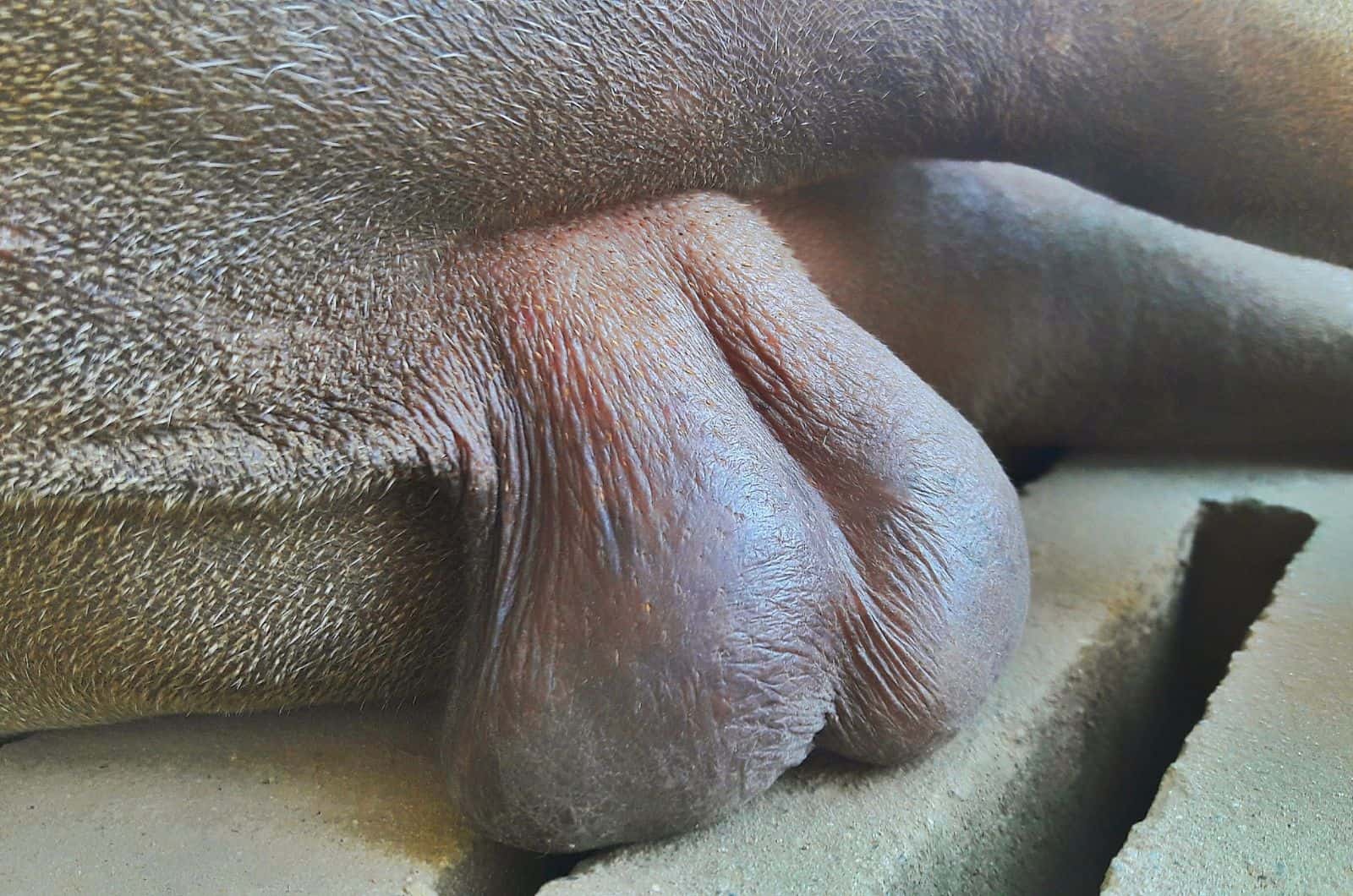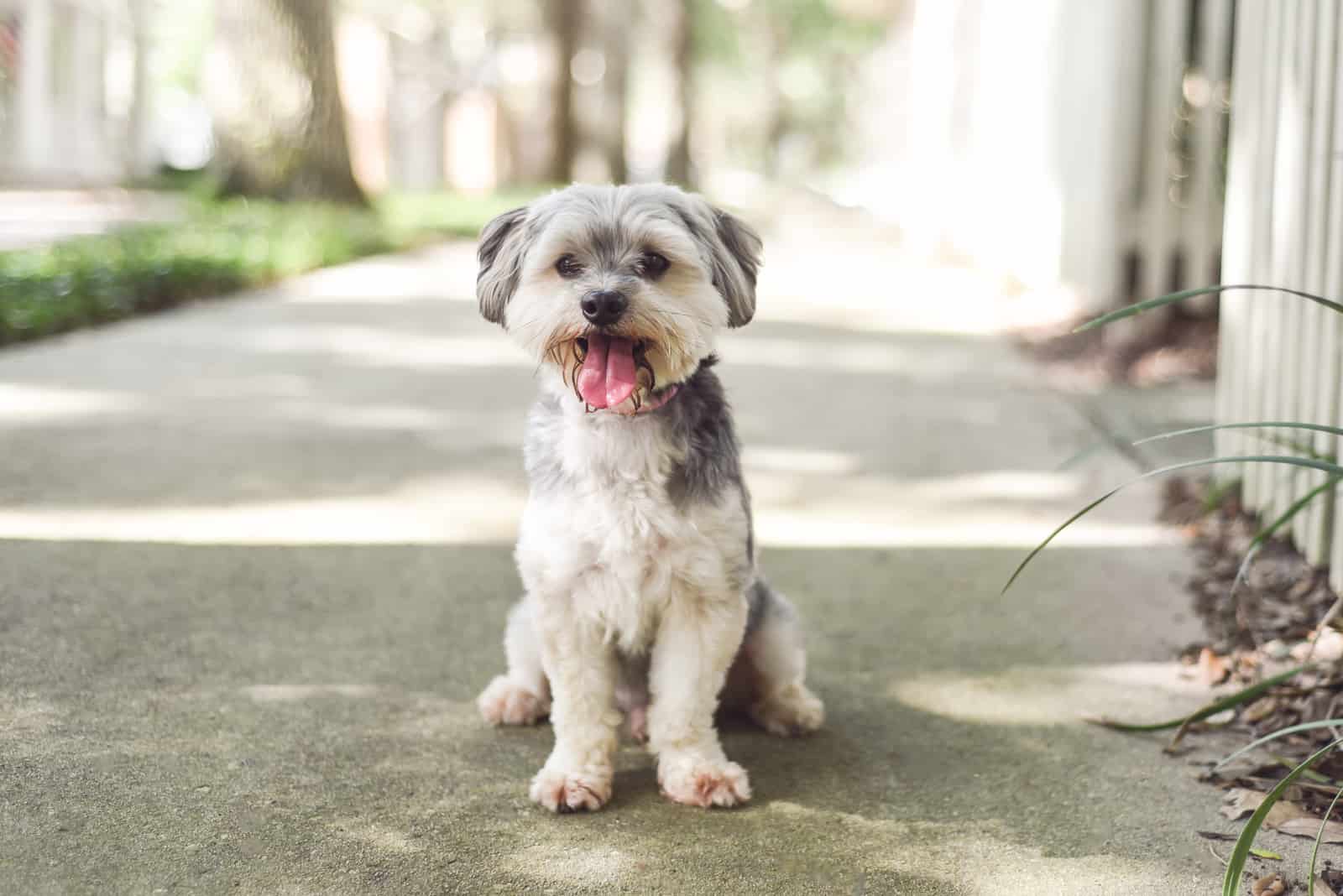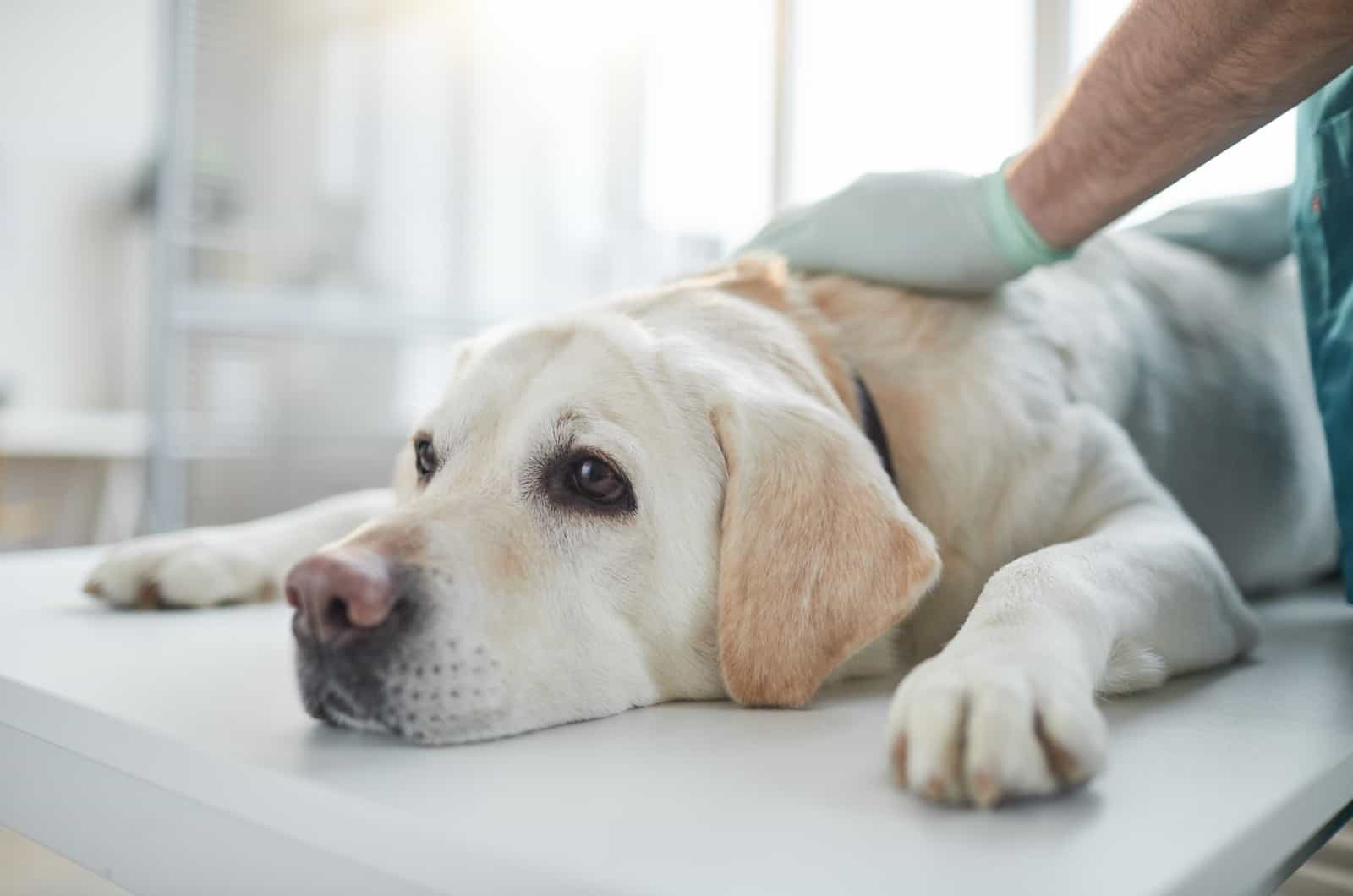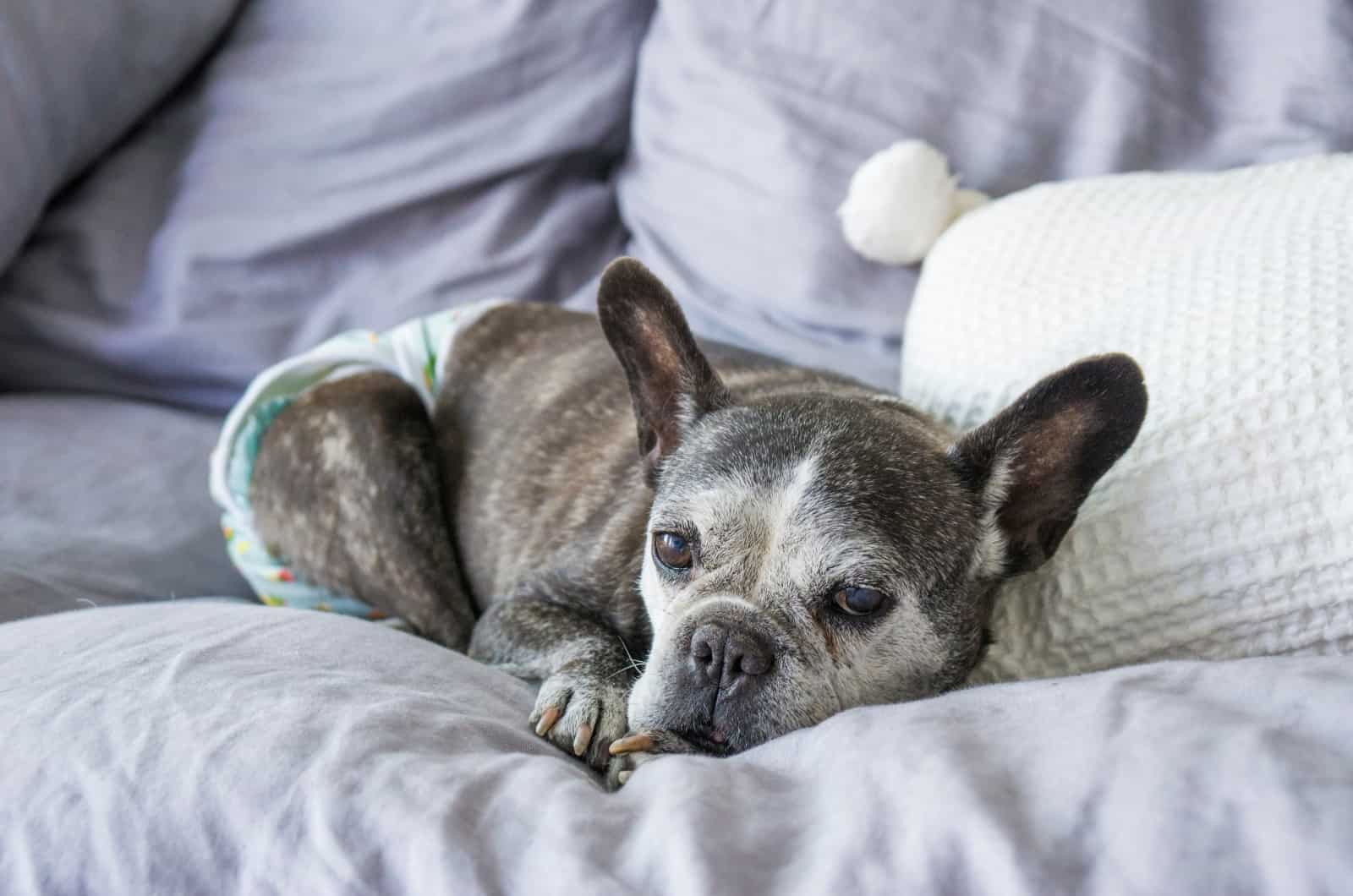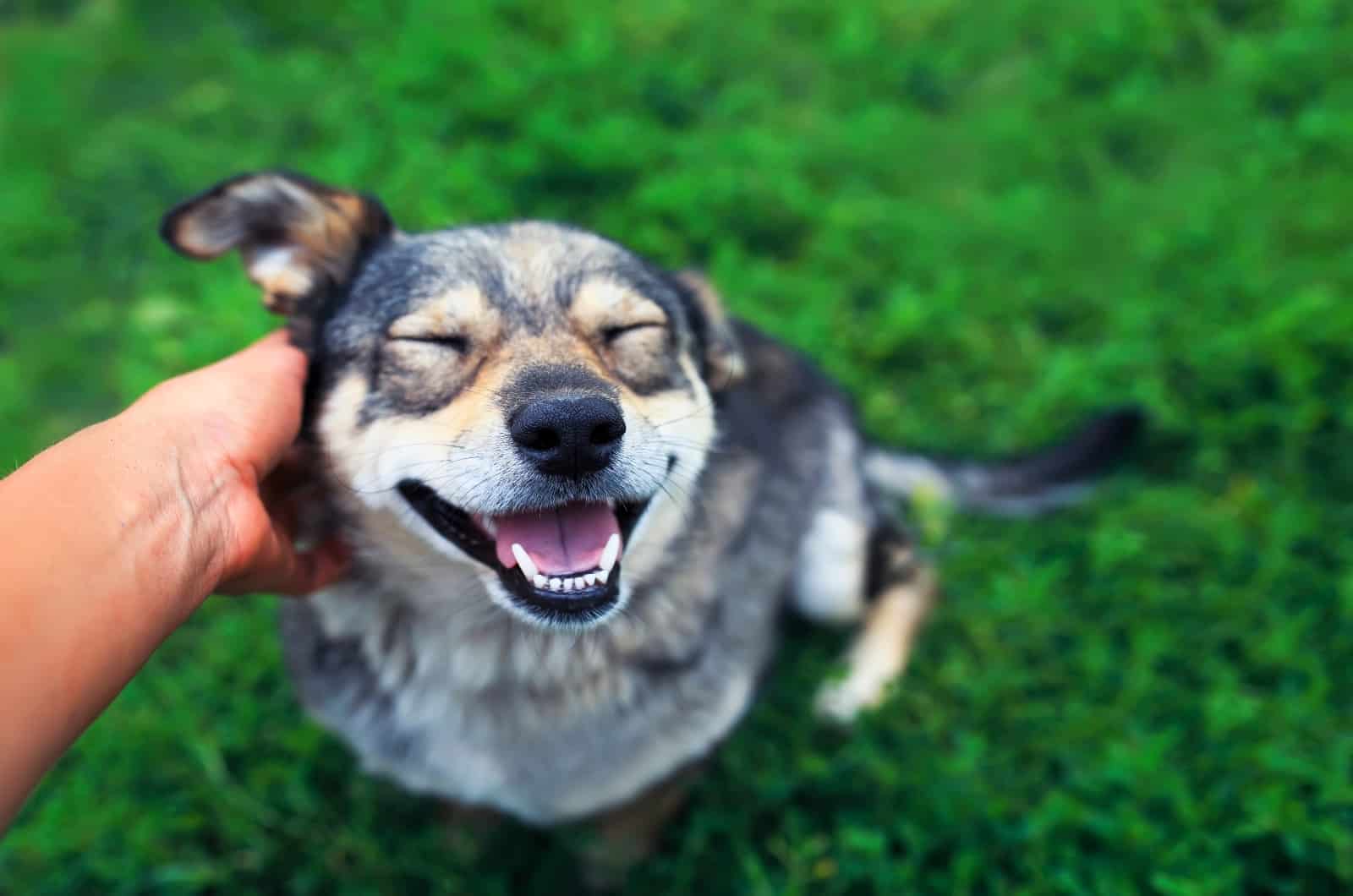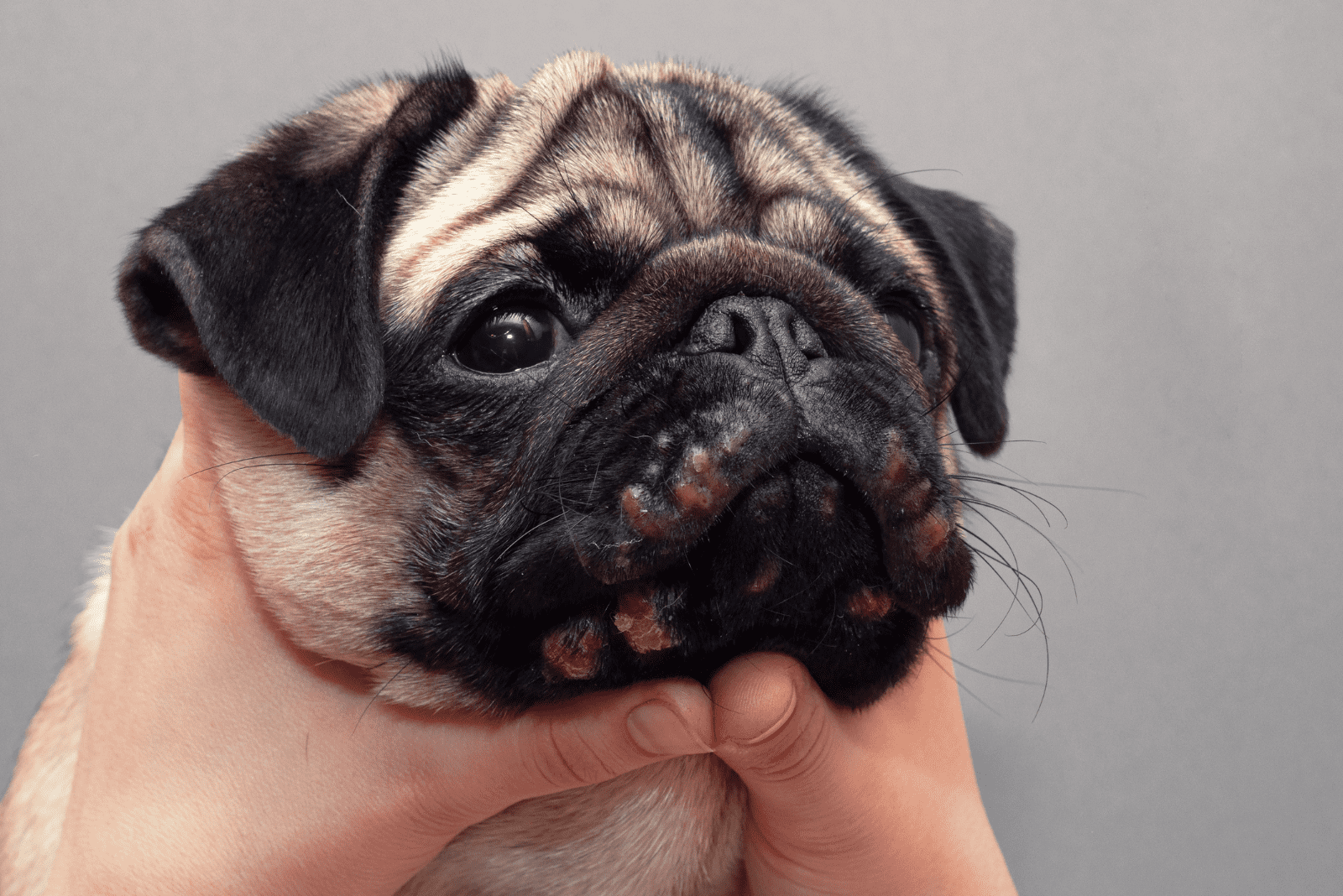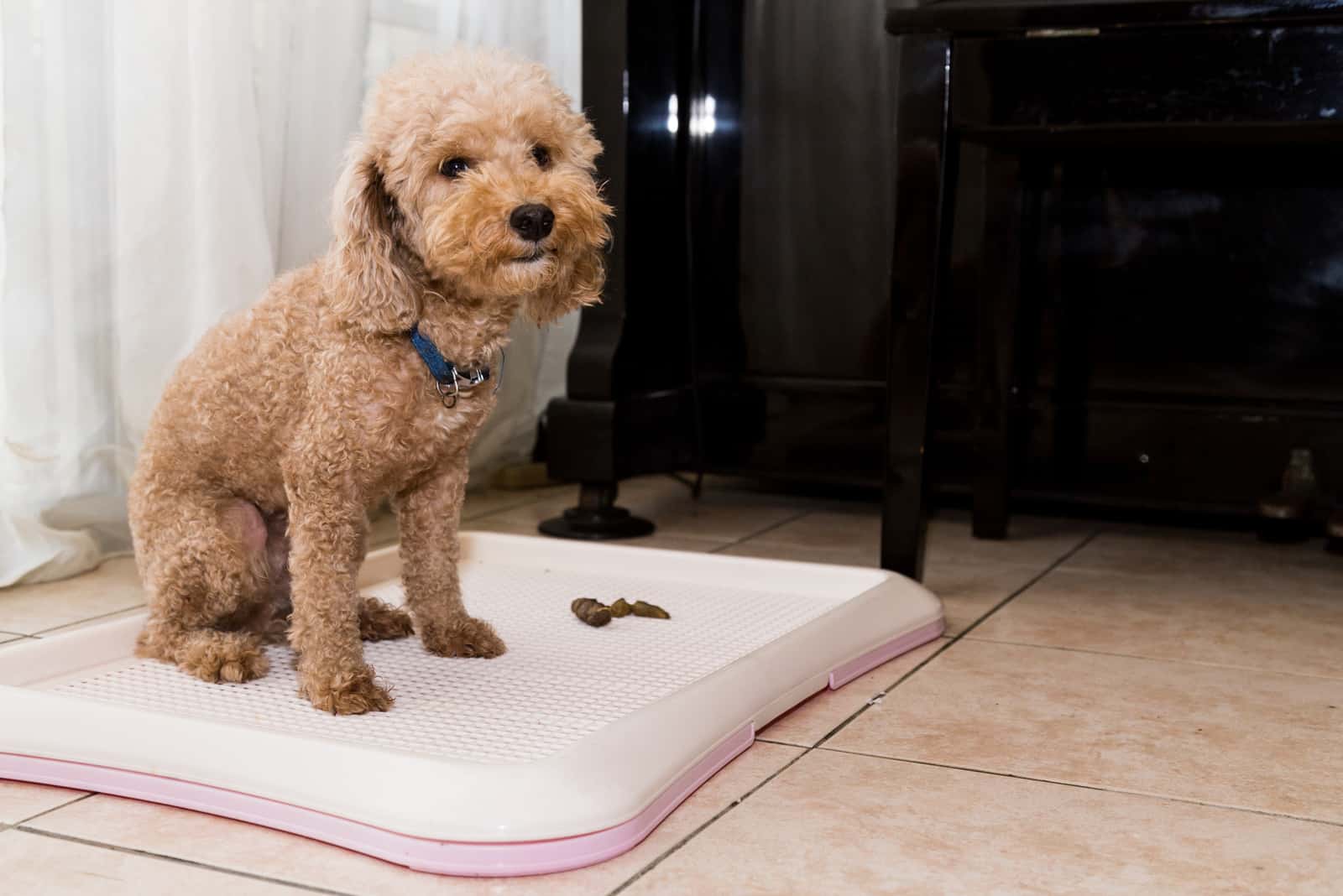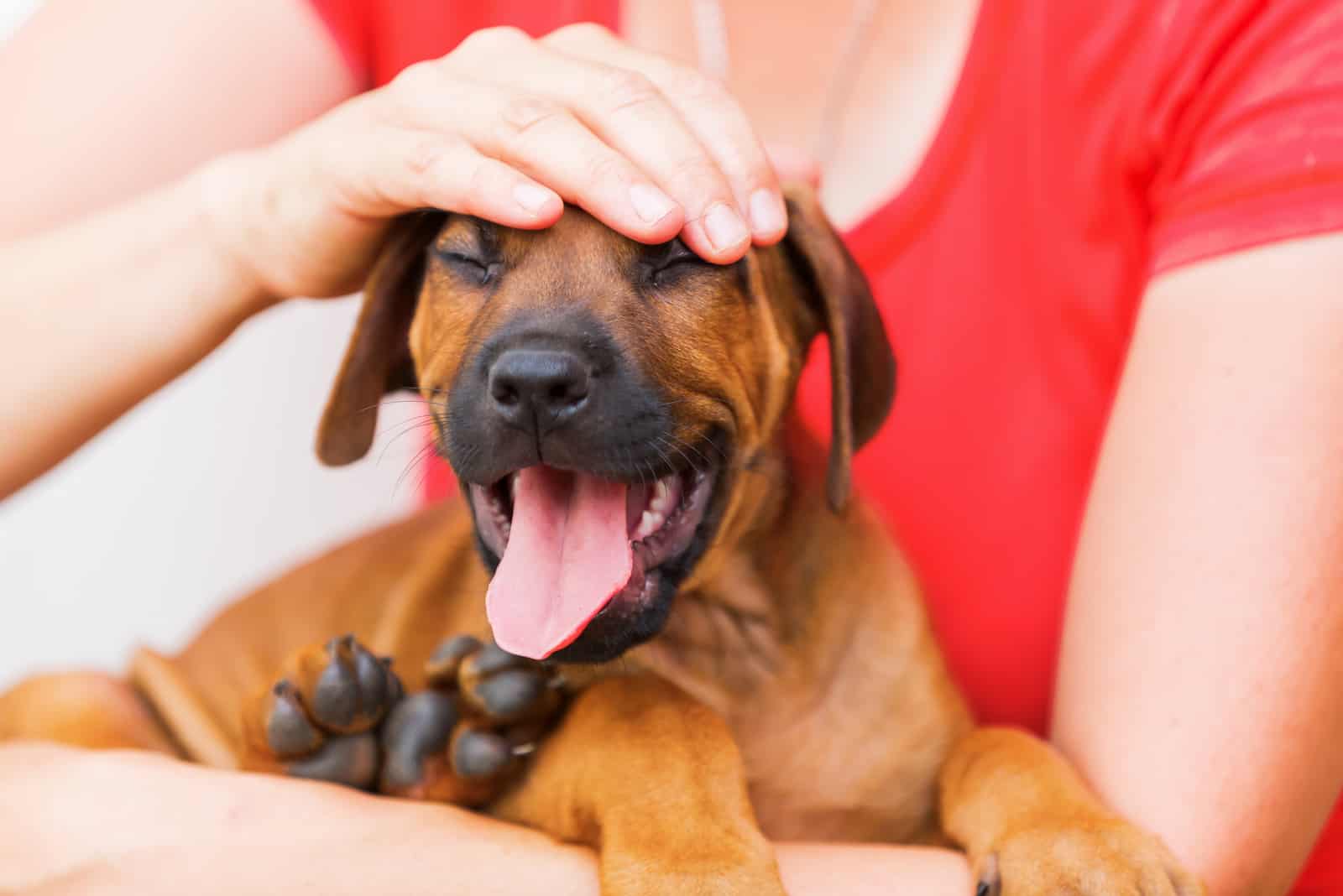Watching your dog become skinnier by the day can ring your inner alarm bell, but sometimes the fix is easy. Other times, there is more to it than meets the eye, and your dog might require veterinary intervention.
Today, you will find the answers to “Why is my German shepherd skinny” from least to most serious causes. Whether it is a diet-related problem or an underlying health problem, you will leave all the richer for knowledge after reading this article.
Wonder no more “Why is my German shepherd skinny?” as we explore the ins and outs of weight loss and more. Here are the possible resolutions to your query, along with tips to fatten up your GSD.
Answering The Question Why Is My German Shepherd So Skinny
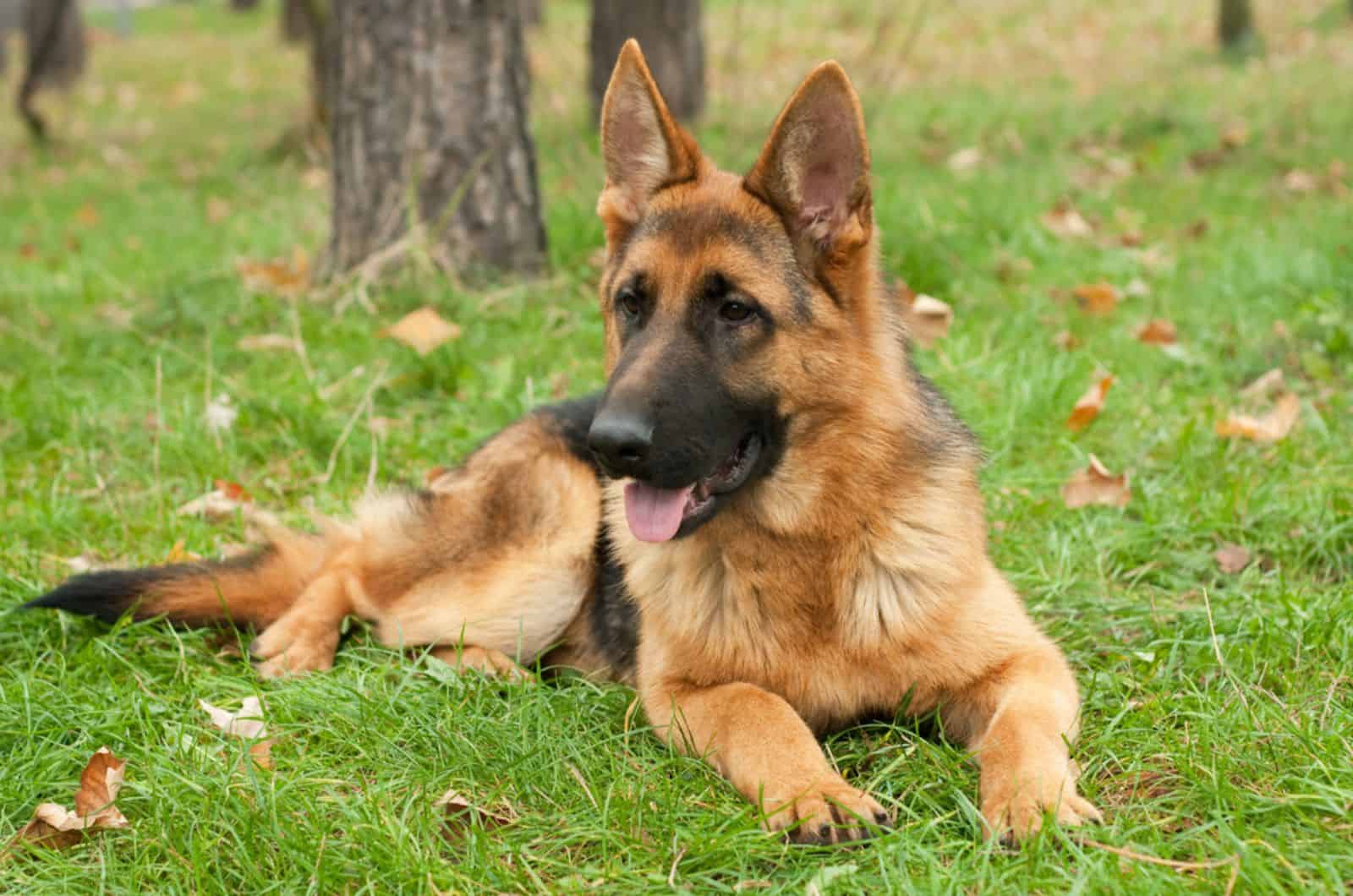
By far, the most common reason for a skinny GSD is a caloric deficit or bad eating habits. This is a “user error” that can be fixed fairly easily, but taking your dog to the veterinarian first is the best thing for the majority of dog owners.
Health conditions that affect metabolism and nutrient absorption are common too, but not as much as malnutrition or not eating enough dog food. Some of these health issues can be tough to diagnose based on the dog being too skinny alone.
For a GSD to be a healthy dog, a specific amount of food that matches their activity levels must be fed. Not only that, but the quality of food has to be high to provide all the required nutrients that make for a comprehensive diet.
A great way to know how much food provides enough calories for a puppy or adult GSD is a German shepherd feeding chart, so here is one we created for you.
Age plays a major role in the health of a dog. Naturally, the older the dog, the bigger the chance of health problems or a loss of appetite. Senior dogs will require diet changes to avoid complications due to poor nutrition or to curb symptoms of underlying health problems.
Answers to “Why is my German shepherd skinny” are very dog-specific, and this is exactly what the article aims to provide — an explanation that you will be able to compare to your German shepherd’s physical state.
1. Not Enough Calories
A German shepherd is a high-energy dog breed that requires regular exercise and plenty of training. Intense physical activity has to be fueled by a complete diet that includes adequate amounts of protein, fat, and carbohydrates.
When the amount of calories does not meet the high energy demands, your GSD might start losing weight rapidly. It usually does not occur in a few days, but the rib cage might become more pronounced after a couple of weeks of eating less than the German shepherd needs.
Skinny dogs should receive twenty percent fat content from dry matter or five to ten percent if on a wet food diet. Adding canned food that is made for recovery after surgery into dry food meals is a great way for your GSD to bulk up.
Another tip is to feed an adult dog large breed puppy food due to its high-calorie composition that gives all the essential nutrients for a developing puppy.
For healthy weight upkeep, you can refer to the feeding chart provided in the previous chapter. Still, here is the rule of thumb ratio of protein, fat, and calcium for puppies and adult dogs.
Puppies should eat around thirty percent protein, nine percent dry matter fat, and one and a half percent calcium content in their meals. Adult GSDs should have a lower protein and calcium content than puppies.
Look for the Association of American Feed Control Officials’ certification on food packaging. This is confirmation of high-quality, tested food that is guaranteed to provide the necessary nutritional values for your dog.
Another thing to consider is buying the right food for your dog. Large dog breeds have different dietary requirements from small or medium-sized dogs, so a large breed type of food will do nicely.
2. Bad Eating Habits
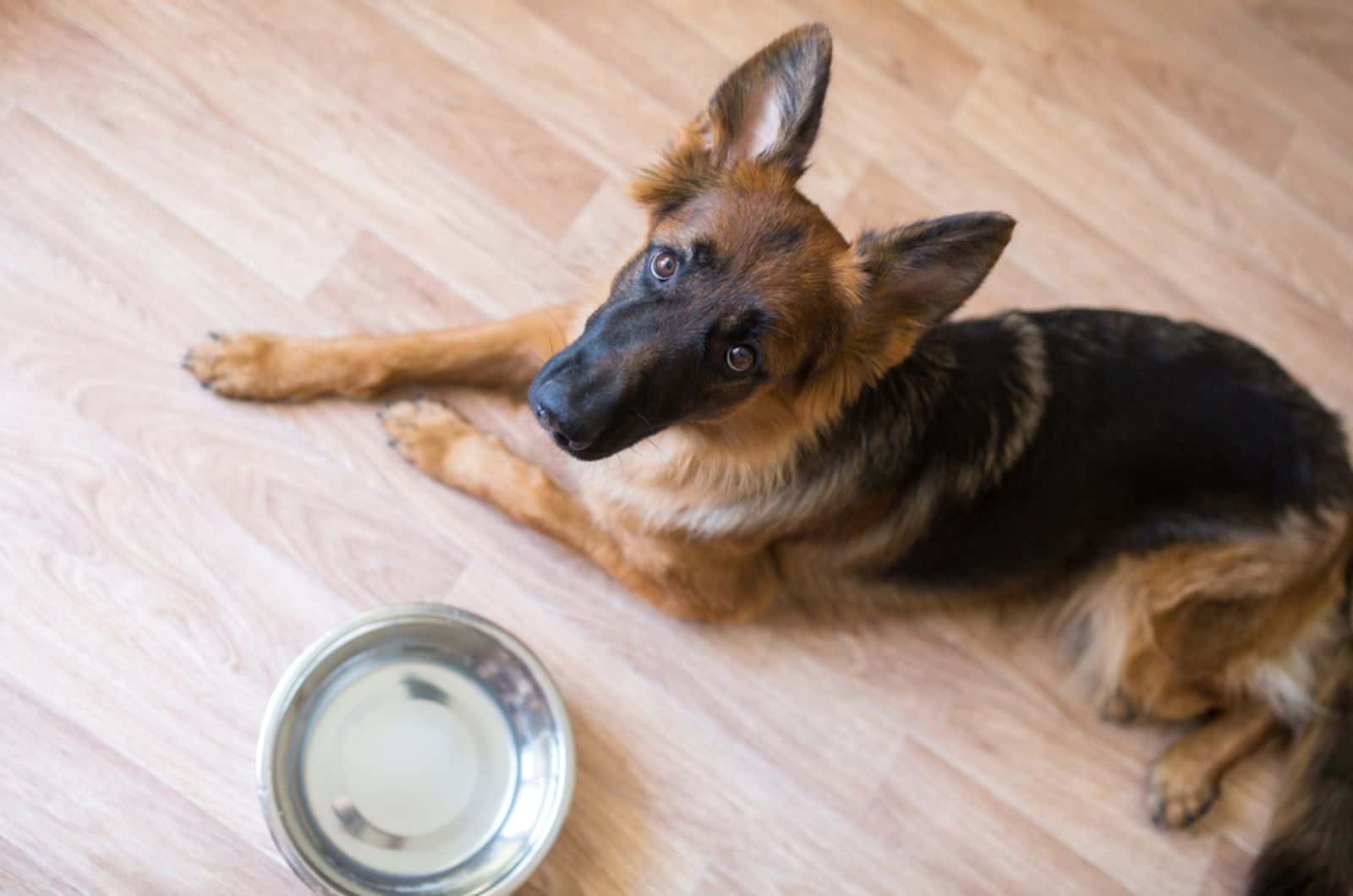
German shepherd owners can have the right diet nailed down but kill their efforts by instilling bad eating habits in their dogs.
No matter how healthy or complete your GSD’s diet is, if you feed table scraps to it, the chance of it backfiring is extremely high. Dogs can develop a taste for food that we humans eat and decide that dog food is not tasty enough.
While this is not the same as loss of appetite, it will have the same result — a skinny dog that refuses dry and canned wet food. This habit will create a disbalance in nutrients, leading to a fast loss of weight.
However, eating foods with high carbohydrate and fat content does not provide the required protein amounts, despite being highly caloric.
You would think that feeding human food leftovers from time to time will cause weight gain or obesity, but the irregular frequency of eating will accomplish the opposite. The more “refined palate” of your GSD will likely make your life more difficult.
If you wish to give your dog a taste of human cuisine, you always have the option of home-cooked diets or raw diets. Our article on homemade foods for Belgian Malinois should give you enough ideas to create an amazing cooked food diet for your German shepherd.
Dog treats usually provide supplemental calories, but these five recipes for dog sweet potato treats can give that higher calorie count for the day. Being a simple carbohydrate, sweet potatoes are incredible energy boosters that can keep your GSD running for a little bit longer.
Feeding Frequency
Depending on the level of your GSD’s physical activity levels, you might have to feed it not just more food but also more frequently. If you are wondering, “Why is my German shepherd skinny?” the answer might be that you are feeding it one big meal a day.
This is not an ideal scenario in any case. While one huge meal can have all the necessary calories, the dog’s body cannot process it fast enough to absorb the nutrients efficiently. Overfeeding your GSD in one meal can cause vomiting, removing all the nutrients from the body.
Being dogs that love running around and working, German shepherds will look to get straight into physical activity after eating. With a full stomach, the strain on the stomach can push the food out.
Gulping down food as fast as possible is a dog thing. A giant bowl of food disappearing within a minute or two can also result in vomiting, leaving the dog without nutrients.
Your GSD might connect eating with vomiting, which will lead to refusal to eat. This is a learned behavior problem that stems from associating feeding time with a negative experience. It is harder to revert the behavior to normal than it is to establish this bad habit.
3. Switching Foods And Diets
Getting used to things and changing them is tough for humans too. Dogs that are on a high-quality diet will not require a diet change.
Dog owners experimenting with different brands of dog food can find themselves in a pickle if the change is too sudden or too radical. All foods are not made the same. Some might have too many filler ingredients, and the dog can refuse to eat them.
Fillers are usually corn or grains that are hard to digest for your German shepherd, providing no real nutritional value. These can be found in abundance in low-quality dog food.
Quality food can taste bad, as we all know, so your dog’s olfactory system and taste buds might not take kindly to the diet switch. Refusing to eat food that does not stimulate digestion is natural, so keep that in mind when considering alternative foods.
Transitioning from a dry or wet food regime to a homemade or raw diet can be a shock to the dog. Although it is rare that a dog prefers commercial foods to ingredients closer to their primal idea of the perfect food, it can happen.
If you are on the fence about raw feeding your GSD, this article on German shepherd raw diet habits might tip you over to one or the other side.
A thing to note is that both home-cooked and raw meals are much more taxing on your wallet and present a challenge for dog owners who do not have much free time for meal preparation.
4. Your German Shepherd Is A Picky Eater
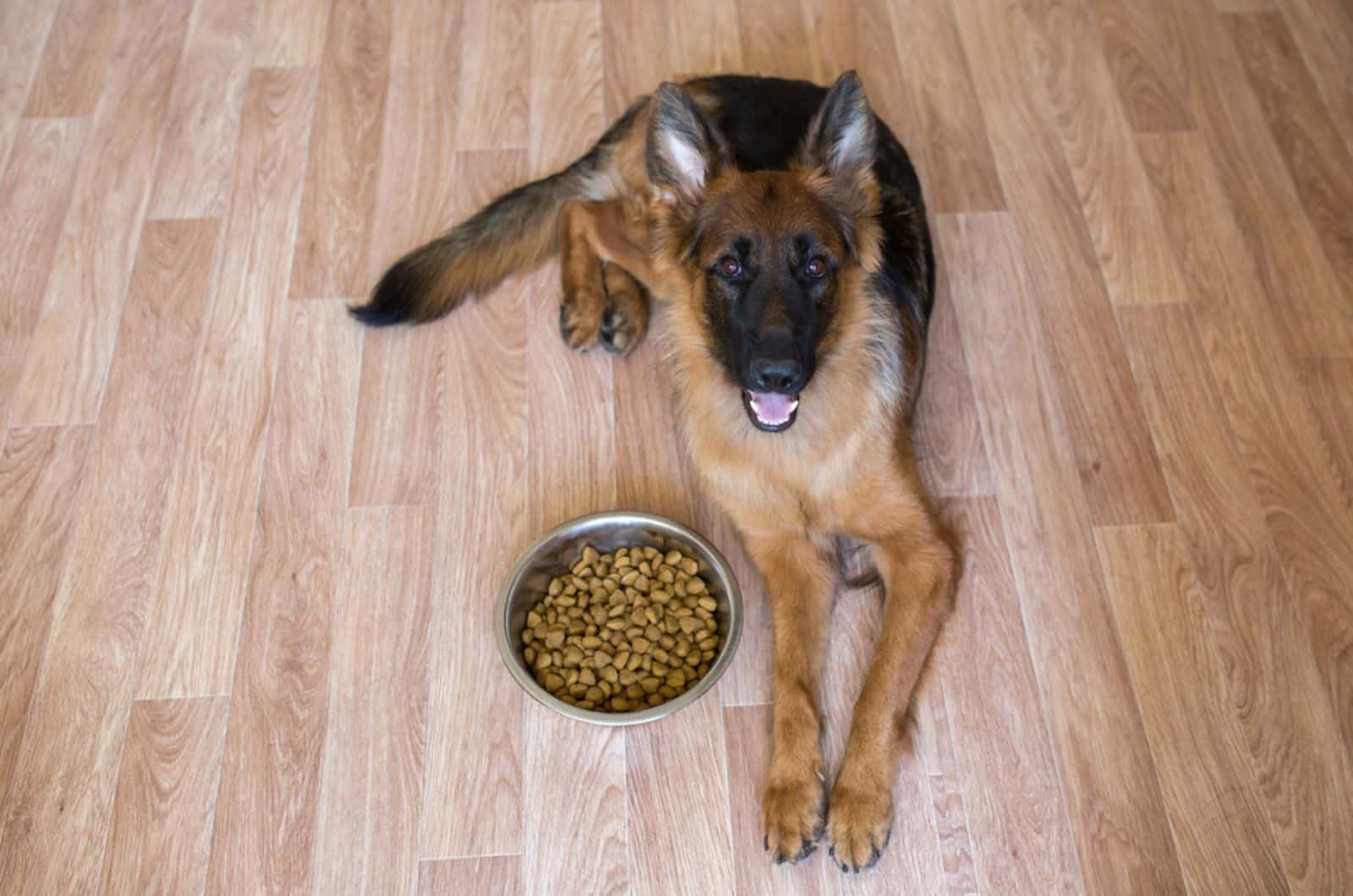
Why is my German shepherd skinny? Is it trying to get on America’s Next Top Model or get that hourglass-shaped body? I seriously doubt that is the answer, but it might have food preferences.
Having food preferences is nothing uncommon in the dog world, but it is rarely a “personality-based” decision. Most often, underlying conditions such as dog allergies are the cause behind avoiding certain foods and loving others.
Testing your dog for allergies is a precaution you should invest in early to detect any possible food sensitivities or allergies.
There are other health problems that can cause a loss of appetite or metabolic instabilities that result in an underweight German shepherd, which we will go through in a minute.
Sudden changes in a diet or food brands and feeding your dog table scraps can also be the cause behind your dog’s picky eater reputation. Remember to teach your dog what and when to eat. Do not fall for the poor pooch look while eating lunch with the family.
The best dog food is the one your dog enjoys eating. One home-cooked meal all dogs love is boiled chicken with rice, which we coincidentally have a recipe for.
5. Environmental Stress
Are you busy doing some house renovation or in the process of moving? I am sure it is causing you a lot of stress, but your German shepherd is probably very upset too.
Sudden changes in its well-established safe space can create behavioral problems that include loss of appetite. Contractors walking around the house or unknown people, in general, are stressful scenarios for your dog.
Moving to another house means completely new territory for your dog, so refusal to eat can lead to weight loss related to fear, insecurity, and re-establishing eating routines in a brand new environment.
Suppose this period of change coincides with your dog becoming disinterested in food, followed by a noticeable weight increase from a healthy German shepherd’s body. In that case, it is most likely stress induced.
These are two extremes, though. A simple displacement of food and water bowls or crate often have a similar effect on your GSD’s health.
Make sure to teach your dog to associate most of these situations with a positive experience, like giving out homemade treats when there is noise, strangers, or you are moving between two places.
Because the cause of weight loss is non-medical, there is not much your veterinarian can do, but definitely ask for advice from them. Another possibility is looking for tips from a certified dog trainer or behaviorist on how to prevent or curb this type of behavior.
6. A Problem As Old As Old Age
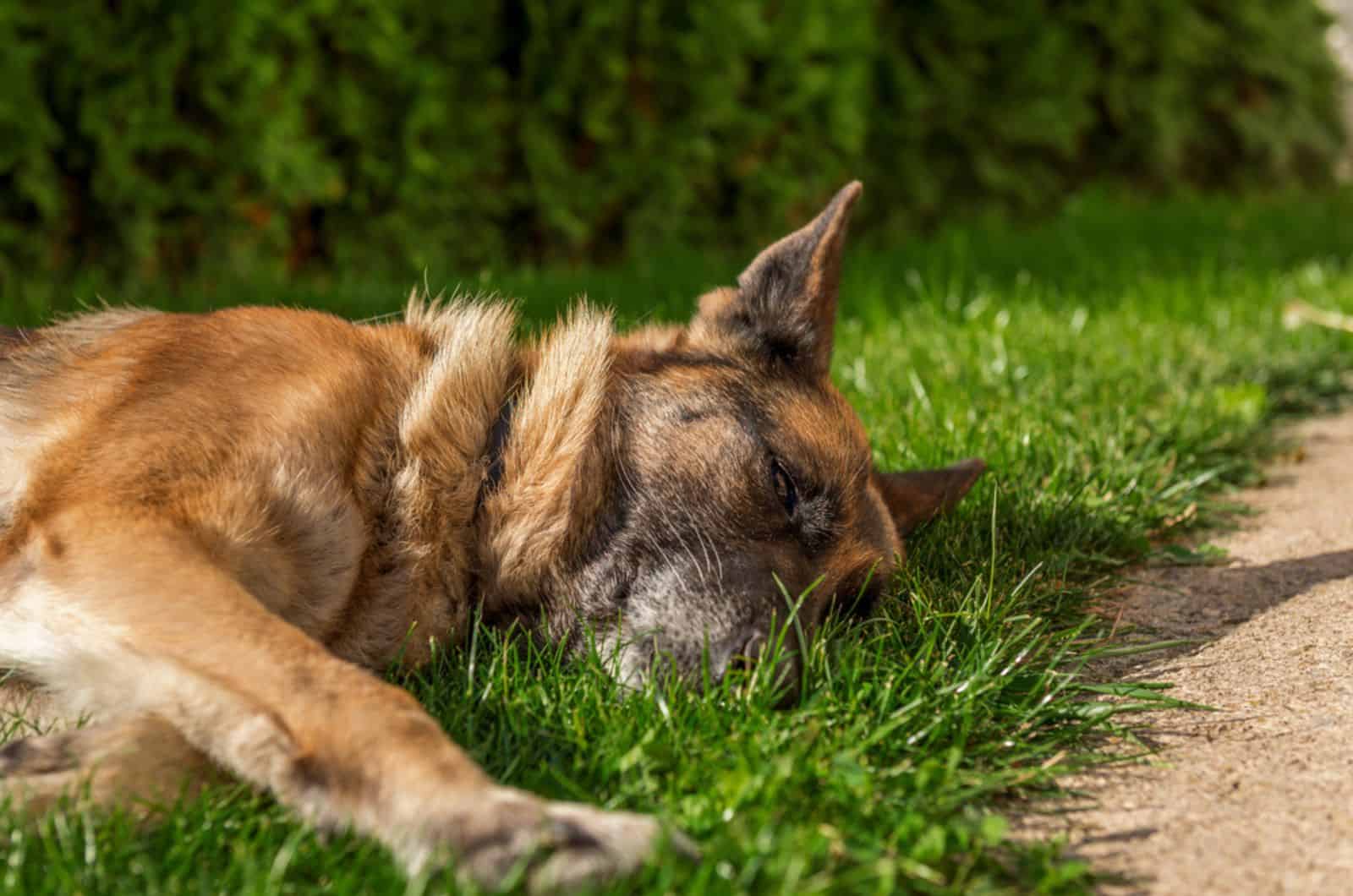
Senior dogs will naturally lose appetite with the reduction of physical activity due to loss of muscle mass, chronic pain, and oxidative stress itself.
Large dog breeds, like the German shepherd, have a shorter lifespan than small dog breeds, despite the opposite being true with most other animal species. Taking proper care of your GSD’s nutrition and exercise needs will prolong its life expectancy.
However, at one point, there will be nothing to prevent your dog from becoming underweight. When cellular metabolism decays and oxidative stress is high, the entire body will start decaying.
This phenomenon is a guarantee for all species on Earth, and it is known as getting old. Of course, there is nothing wrong with it, but you might want to try feeding your dog high-calorie dog food. German shepherd puppy food with supplements is an option to get a higher number of calories in.
For the right amount of food and the correct ratio of nutrients, consult a veterinarian or dog nutritionist.
7. Dental Problems
The two most common occurrences of dental issues in dogs are dental fractures and periodontal disease. Both conditions are hard to diagnose without regular vet checkups or routine home mouth checks.
While broken teeth are not difficult to diagnose, periodontal disease can easily elude a positive diagnosis. It is largely asymptomatic, making it a condition found in eighty percent of dogs older than three years.
Gums or periodontium is the soft tissue that surrounds your GSD’s teeth. Like any other tissue in a dog’s body, it can suffer from inflammation due to trauma or infection. The first layer of the gums, called gingiva, can get inflamed, leading to gingivitis.
Untreated gingivitis can spread to the deeper layers and spread to the bones, causing body-wide inflammation and infection. The tartar (mineralized plaque) buildup is difficult to remove and is host to many bacteria that reside in the mouth.
Gingivitis makes chewing and nibbling painful, which deters the dog from eating food. If you notice your dog being constantly hungry but refusing to eat, check for redness of gums or lesions.
Practicing good oral hygiene with your dog is essential in the prevention of gingivitis and tartar buildup. If gingivitis develops into periodontal disease, you cannot revert the condition but only manage the symptoms with medication.
Do not give your German shepherd things to chew on that are not flexible enough to avoid damaging the dentin or teeth crowns. Dental chews like rawhide and beefhide are great at preventing tartar accumulation and are softer than bones.
8. Intestinal Parasites
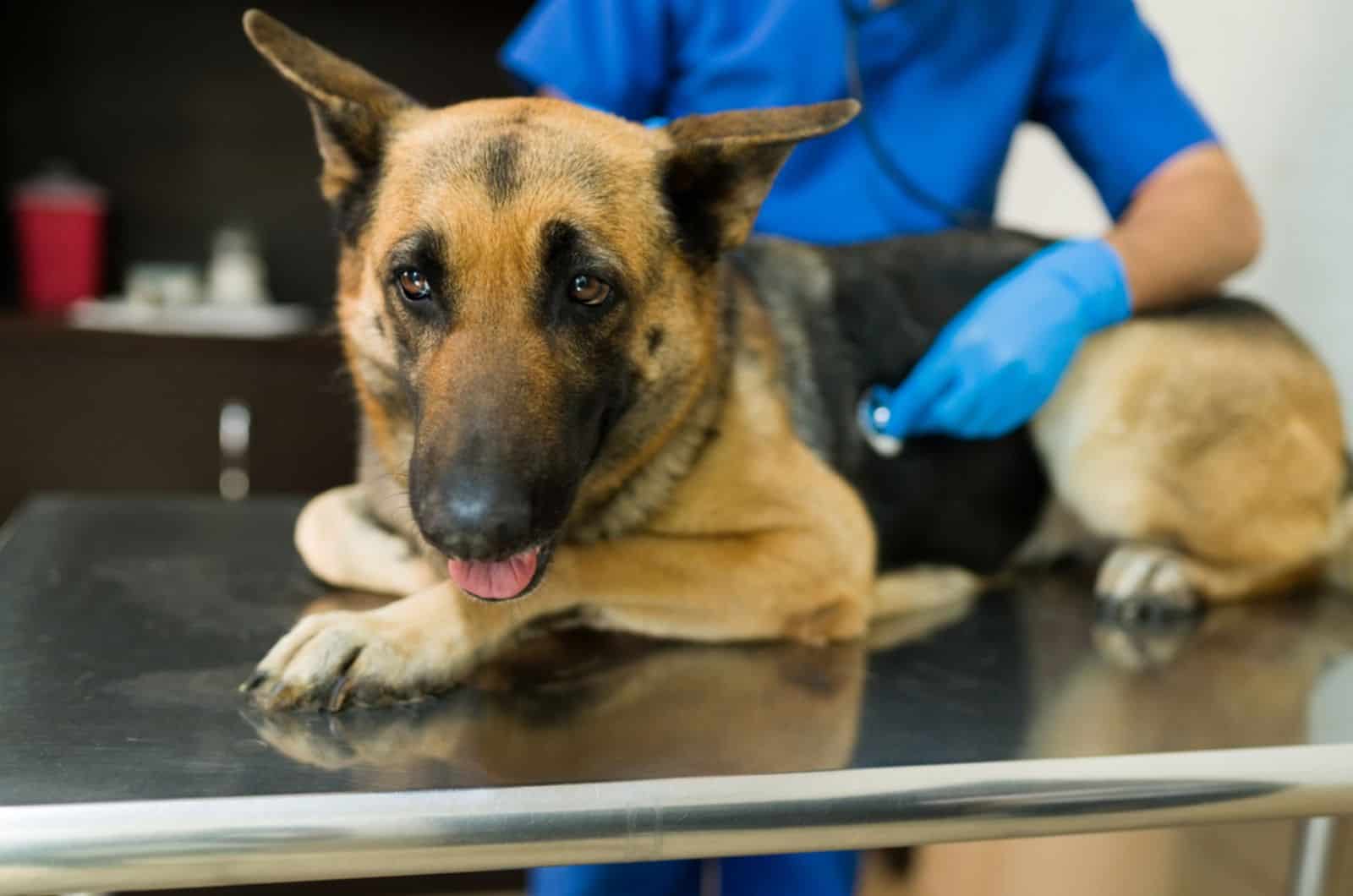
With more than a few kinds of internal parasites, the most common in dogs are roundworms, hookworms, whipworms, and tapeworms. Among these, the Dipylidium caninum tapeworm is most represented in diagnostic veterinary medicine.
The principle intestinal parasites work on is simple — infect the host and take all the nutrients from them. Adult German shepherd dogs will seldom exhibit symptoms, but they usually include weight loss, increased appetite, diarrhea, or vomiting.
Puppies can have stunted growth if infected by Dipylidium. Deworming is a crucial and easy way to prevent intestinal parasites that might impede your pup’s growth and development. The likelihood of an adult dog developing serious problems from a parasite infection is low.
Fleas are the primary carriers of Dipylidium caninum larvae. However, the dog has to eat the flea to become infected.
It is important to mention Echinococcus because it can be transferred from dog to human. It is rarely fatal, except in dogs or people who are already immunocompromised.
Working dogs that are exposed to sheep are at a higher risk of welcoming Echinococcus into their intestine simply because sheep are larvae carriers. The same goes for dogs and people who consume sheep or stock infected by the parasite.
9. Malabsorption Syndrome
Two conditions can cause malabsorption in dogs — small intestinal disease and exocrine pancreatic insufficiency (EPI).
Why is my German shepherd skinny, and what does it have to do with the pancreas? Well, all the nutrients your dog takes in from food are absorbed in the small intestine, and the phases their conversion into energy allows for are controlled by pancreatic enzymes.
Carbohydrates, proteins, and fat all have an almost identical mechanism of absorption that consists of the pancreatic enzymes “simplifying” the cellular structure of the nutrients to be able to pass through the intestinal wall.
Malabsorption can be the second condition in the chain of disrupted metabolic functions that directly participate in nutrient absorption. The first link in the chain is the degradation of dietary constituents, i.e., the food that is digested in the stomach.
Gastritis is defined as the irregular secretion of gastric acid, which impedes the ability to break down food into a form that can be further degraded in the small intestine. This is called maldigestion and is present in dogs, especially large breeds like the GSD.
In the majority of cases, the symptoms consist of diarrhea and weight loss despite an increased appetite. Your German shepherd eating a lot of food but still losing weight is a red flag that means you should visit the veterinarian as soon as possible.
10. Liver Disease
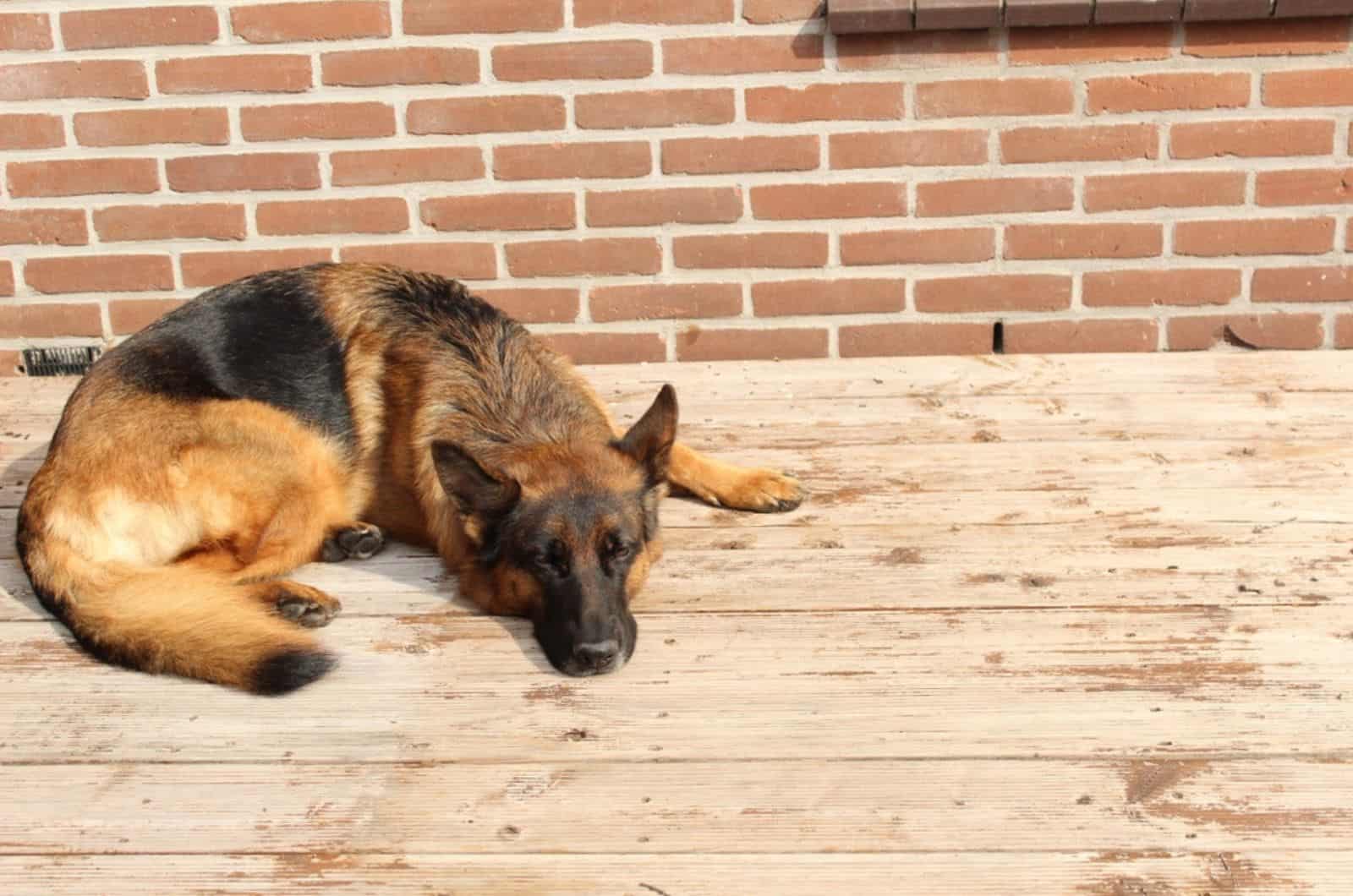
The liver has numerous crucial roles, but in terms of digestion-related functions, its production of bile acids to facilitate digestion and vitamin storage, metabolization, and activation are the most important.
Any condition that leads to liver failure, such as the ingestion of toxins, is considered serious and requires immediate veterinary attention. Without the ability to detoxify, one of the first systems to suffer is the digestive tract.
Other than weight loss, the following symptoms are also common with liver disease: loss of appetite, ulcers, diarrhea, vomiting, and neurological problems. Another common condition that is a result of liver disease is ascites (effusion of liquid into the stomach).
If you suspect something else is behind your German shepherd’s swollen stomach without the dog exhibiting pain, check out this article explaining the possible causes behind that beer belly.
Liver disease has one symptom that is clear cut — yellow tint of the eyes. This is a sign of liver failure in both dogs and humans, so keep an eye on the eyes (pun not intended).
11. Kidney Disease
This condition is similar to liver disease in the sense that it leads to renal failure if the environmental toxins are too potent or the symptoms are untreated.
It can also occur in dogs that have been on NSAID medication for a prolonged period of time. While with acute kidney disease there is a possibility of reversing the damage, the chronic type is usually far too advanced to heal with the onset of symptoms.
Kidney failure does not imply a complete loss of function but an impairment of the kidney’s ability to get rid of waste products from the blood through urine.
Those (symptoms) include loss of appetite, frequent urination or inability to urinate, weight loss, blood in urine, increased water consumption, diarrhea, etc. As with many other diseases, senior dogs are more prone to kidney failure.
Keep in mind that dogs with this condition have to go on a special diet that is, in most cases, not the tastiest thing around. Expect your GSD to avoid eating it because it does not like it, in addition to losing appetite due to kidney failure.
As a bonus, here are seven vet-approved homemade dog food recipes for pooches that suffer from kidney disease.
12. Heart Disease
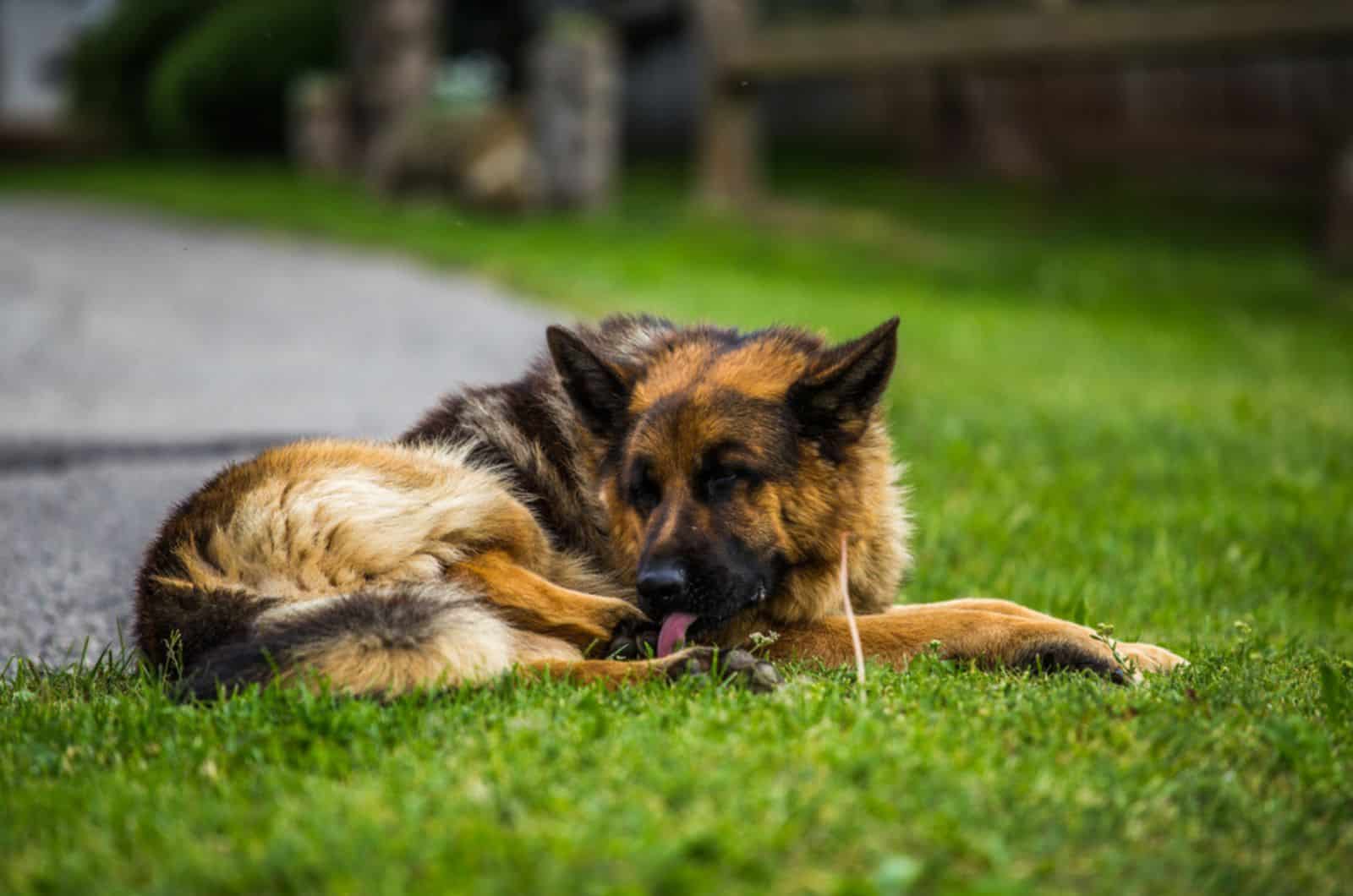
Just like liver and kidney diseases, heart disease is not one single condition but a broad term that encompasses several heart abnormalities. The abnormalities can be caused by genetics (congenital), infections, or severe trauma.
When it comes to German shepherds, the most common conditions that belong to the heart disease category are mitral valve dysplasia (MVD), dilated cardiomyopathy (DM), and heartworm disease.
Weight loss is a symptom of heart disease only in its later stages, which means that your GSD will display more apparent symptoms long before it becomes underweight. If the condition is diagnosed early, the weight loss can be easily reversed.
The first two are congenital, which means they are inherited from the puppy’s parents, while heartworm disease indicates a parasitic infection. Surgical treatment is available for MVD and DM, but its effectiveness largely depends on the severity of the abnormality.
Heartworms are usually treated with melarsomine, which will kill the mature heartworms but not the eggs or larvae. Since bacteria are present in the heartworm itself, antibiotic treatment accompanies the melarsomine.
13. Cancer-Mediated Weight Loss
Known as cancer cachexia, the weight loss that occurs in German shepherds that suffer from cancer has a different way of breaking down tissue. Starvation will first spend the fat as a source of energy, while cachexia simultaneously burns muscle and fat.
Regardless of the type of cancer, the onset of cachexia carries the same effect on all dogs. There are a few other things that GSDs and other dog breeds with cancer do not have going in their favor.
For one, dogs with cancer, more often than not, develop a loss of appetite, so battling cancer cachexia becomes even more difficult. To further worsen things, radiation and chemotherapy also decrease appetite making the task of feeding them all but impossible.
The recommended diet for a dog with cancer has to be rich in fat with normal protein content. More caloric foods mean smaller doses, so a handful of calorie-rich food is better than a large meal, as the chances of a dog with cachexia eating it are rather small.
How To Make A German Shepherd Gain Weight
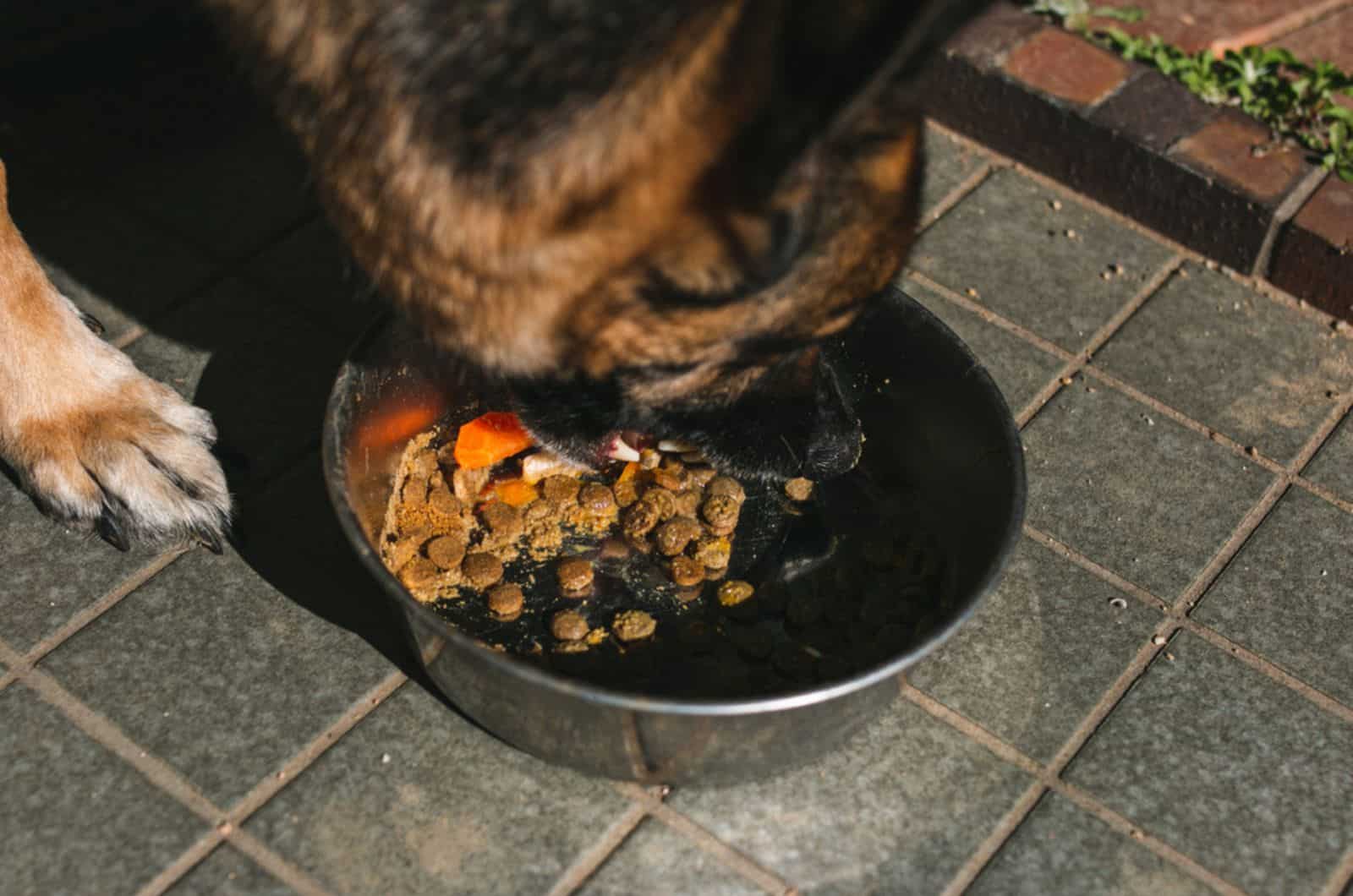
Now that “Why is my German shepherd skinny?” has been answered in thirteen different ways, here are a few tips to get that muscle mass back.
First up, we have a well-known “gainer” that works on humans and dogs alike. It is the mighty peanut butter. Packed with fatty acids, protein, and carbohydrates, this sticky and smooth paste is a godsend for underweight German shepherds.
Even more important than the number of calories in it is the fact that dogs love eating it. A couple of tablespoons with each meal (assuming you feed your dog two or three meals a day) are more than enough to get the needed nutrients and energy.
Important: the peanut butter you plan on giving your skinny German shepherd should not contain Xylitol because it is fatal for dogs. Many peanut butter manufacturers use it as an alternative to sugar, so it is best to avoid human-designated commercial peanut butter.
There are dog-specific versions that are completely safe, or you could just make your own peanut butter without adding any salt to it (potassium causes health issues in dogs).
Wet Food, Puppy Mush, And Chicken And Rice
If your dog is not eating food due to periodontal disease or a broken tooth, wet foods or puppy mush are amazingly caloric and healthy. If you do not know how to make puppy mush, here is a recipe explaining the entire process.
Canned wet foods can mean anything that does not have to be chewed to be swallowed. The most important thing is to choose high-quality wet food. If there is an upset of the digestive tract, the wet food might cause runny stools, but most of the fat and protein content will be absorbed.
You can never go wrong with chicken and rice. We already shared our superior boiled chicken and rice recipe, but if you need more, I am giving you this absolute gem of a recipe — hamburger and rice for dogs.
But wait, there is more. Tried all the options we have offered so far? Here is an article that will reveal all the things you can feed a sick dog with no appetite.
As an added bonus, I am leaving this short list of articles we wrote explaining the effects different ingredients/foods have on dogs:
- Can dogs eat Brussels sprouts?
- Can dogs eat turnips?
- Can dogs eat tuna?
- Can dogs eat artichokes?
Conclusion
Never will you ever have to ask, “Why is my German shepherd skinny?”. You know the answers and have quite a few solutions that can motivate you to improvise with what you have or what is available to you.
It is important to assess the situation with the help of a veterinarian before the weight loss. Any loss of appetite that lasts for longer than two days warrants a visit to the vet. It is better to be proactive than reactive.
Usually, the diagnosis is simple and easily solvable, but I implore all German shepherd owners to be aware of all possibilities. Hopefully, this light read was enough to put your mind at ease.

